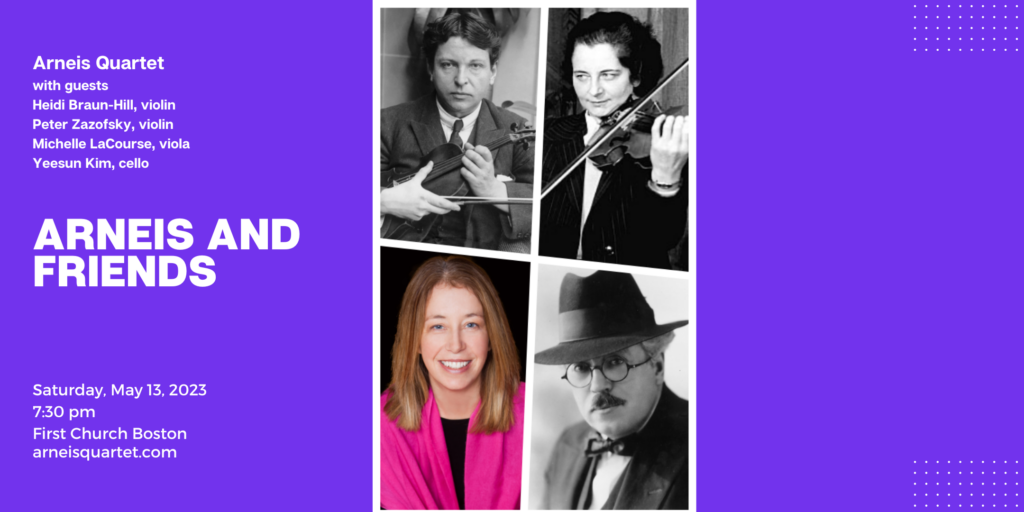
Financial support from donors is a key factor in helping Arneis achieve its artistic objectives. Please consider donating today! Arneis is a 501(c)(3) nonprofit organization and all donations are tax deductible.

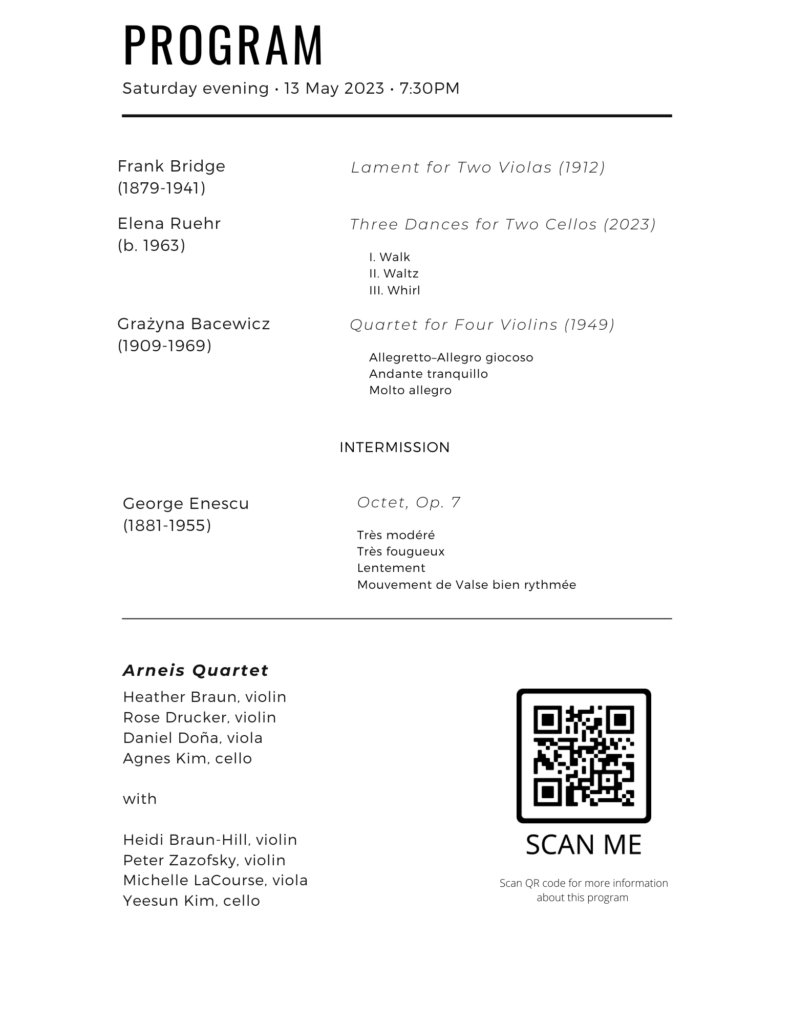
Program Notes
Mentorship and friendship are two things that lie at the heart of dedicating oneself to making chamber music, and for this program Arneis invited a few of its closest mentors and friends to perform repertoire some would describe as off the beaten path. Frank Bridge’s Lament for Two Violas opens the program, giving the listener a taste of one of the golden eras of composition for the instrument. A world premiere of a cello duo written by Elena Ruehr is followed by Grazyna Bacewicz’s Quartet for Four Violins. The program concludes with all musicians joining forces for George Enescu’s symphonic Octet in C major, Op. 7 which he dedicated to one of his teachers at the Paris Conservatory. During his time as a student at the Royal College of Music Frank Bridge trained primarily as a violinist and violist, although added the study of composition when he won a foundation scholarship to study with C.V. Stanford. Upon graduation from RCM he grew in reputation as a violist, so much so that when the Joachim Quartet came to London in 1906 he was asked to fill in for violist Emanuel Wirth who had fallen ill. He was also involved in the UK premiere of the Debussy String Quartet. Bridge wrote the Lament and Caprice for Two Violas for a concert given on 18 March 1912 with Lionel Tertis. While the original manuscript copies are lost, a complete ink sketch of the Lament survives and is the basis of the version prepared by Paul Hindmarsh which is presented today. While Bridge made a choice to gradually forgo his career as a performer to focus on composition George Enescu attempted to equally divide his energies between being a composer and major concert violinist throughout his career. Enescu first studied violin and composition at the Konservatorium der Gesellschaft der Musikfreunde in Vienna where he played Brahms’s works in the conservatory orchestra with the composer present. In 1895 he continued his studies at the Paris Conservatoire; his composition teachers were Jules Massenet and Gabriel Fauré, and one of his most notable classmates was Maurice Ravel. Enescu started work on his Octet in 1899, and the project occupied him for a year and a half and the herculean effort is captured when he wrote to a friend: "I wore myself out trying to make work a piece of music divided into four segments of such length that each of them was likely at any moment to break. An engineer launching his first suspension bridge over a river, could not feel more anxiety than I felt when I set out to darken my paper" Many people hear similarities between this work and Schoenberg’s Verklarte Nacht (1899). While both works were composed at around the same time, Shoenberg’s work wasn’t premiered until 1902 so the similarities between the two works are due more to shared influence of composers like Brahms, Reger, Debussy, Franck, and Wagner. Enescu dedicated his Octet to André Gédalge, his beloved teacher of counterpoint and fugue at the Paris Conservatoire. Upon hearing the work one definitely understands why the dedication is particularly apropos! Grażyna Bacewicz also distinguished herself as an accomplished concert violinist and composer. She attended the Warsaw Conservatory and then went to Paris to further her studies with Nadia Boulanger and Carl Flesch. Her Quartet for Four Violins was written in 1949 and dedicated to violin students in Lodz. The use of folk-like material in a neo-classical vein is in line with the “socialist realism” style prescribed by the pro-Soviet authorities governing Poland at that time. Bacewicz was also an accomplished writer so hearing narrative aspects in her music is no surprise! -Daniel Doña When fabulous cellists Agnes Minkyung Kim and Yeesun Kim Kitchen asked me to write a piece for them I was delighted. I knew I wanted to write something virtuosic that showed off the talents of these two fine musicians. At the time I started working, I was on a trip and staying in an upscale business hotel. There was a groove playing the lobby, over and over, and it stuck in my head: it became the opening phrase of the first movement. I thought I would play with that idea, tease it out as much as possible, and these three dances are the result. The three dances are: Walk, Waltz, and Whirl, fast, slow, very fast. -Elena Ruehr, Brookline MA 2023
Artist Bios
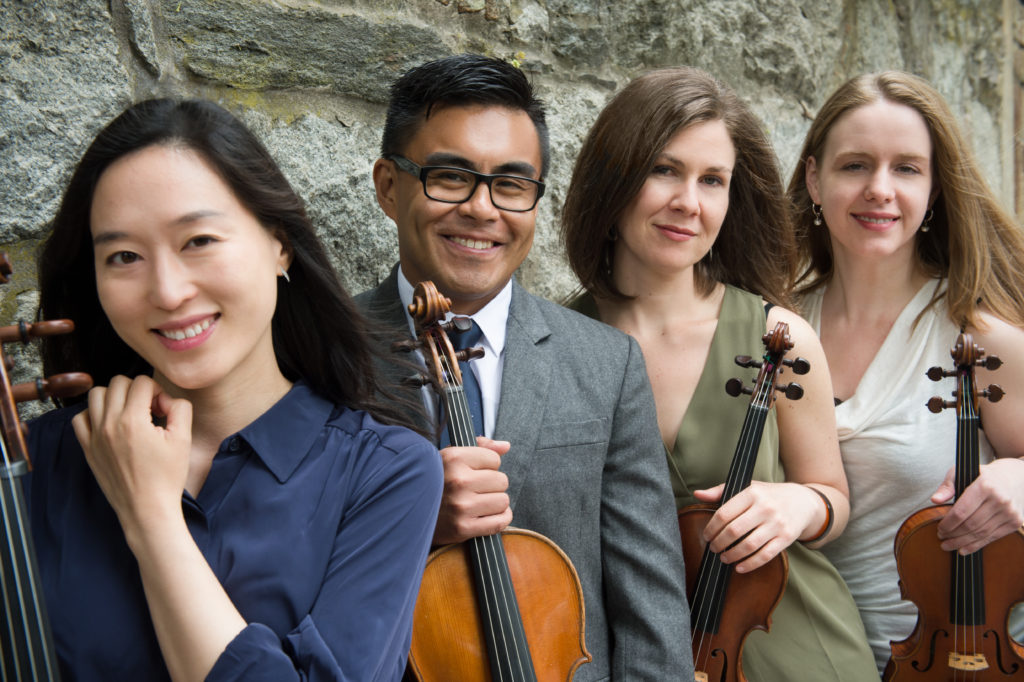
Arneis Quartet Heather Braun, violin Rose Drucker, violin Daniel Doña, viola Agnes Kim, cello “With high risks came high reward, and the Arneis Quartet offered an intense, indelible experience…” (The Boston Globe) The Arneis Quartet performs an eclectic range of programs from the standard to contemporary, including commissions of new works and interdisciplinary collaborations in New England and throughout the world. Known for playing with “a conviction that commands attention” (Fanfare) and “a unique collective sound which is as warm and full of sparkle as liquid gold” (Boston Musical Intelligencer), the quartet is playfully named after the Arneis grape—a varietal that is difficult to grow, but which yields an exquisite white wine. The Boston-based Arneis Quartet has brought their energetic approach and adventurous programming to traditional concert venues as well as salon-style concerts and community engagement activities since 2009. Collaborating with living composers serves as a key part of the quartet’s artistic mission. Gramophone praised their “vivacious rendition” of Elena Ruehr’s String Quartet No. 8 on a recently released recording of her works. Arneis collaborated with Coro Allegro to premiere Andrea Clearfield’s here i am: i am here, based on open letters by LGBTQ+ youth advocates Mimi Lemay and Sam Brinton. Other recent premieres and collaborations include works by Jonathan Berger, Julien Labro, Ketty Nez, Aaron Travers, and John H. Wallace. Future projects are in development with Susie Ibarra, Van Anh Vo, and Anthony Green. Committed to community engagement and music education, the Quartet has worked with music students at the Boston Arts Academy, Perkins School for the Blind, and the Boston Public Schools. Quartet members are on the faculties of Boston University and St. Anselm College; the Quartet also works with the Boston Youth Symphony Orchestras and work with students in the Intensive Community Program. Outside of their Boston home, Arneis has taught master classes and served as a residency quartet at the Boston University Tanglewood Institute, Point Counterpoint, Swarthmore College and Lyceum Music Festival. They have brought their programs to communities in California, Michigan, Ohio, and Reggio Emilia, Italy.
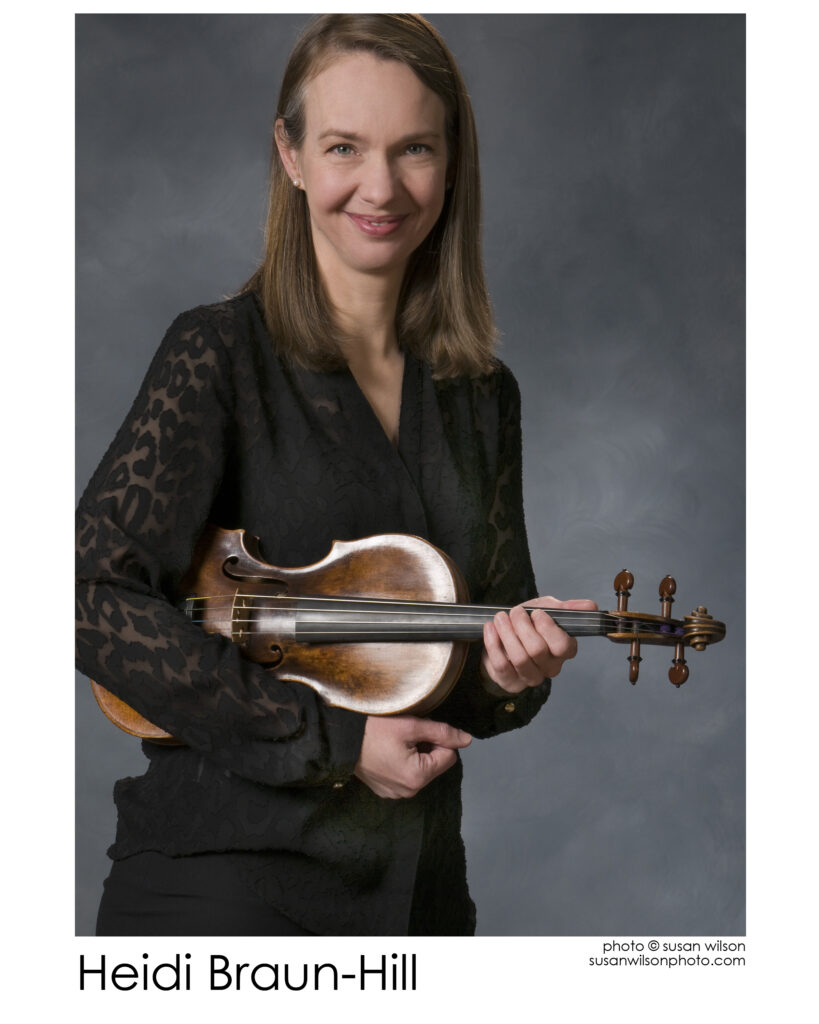
Violinist Heidi Braun-Hill enjoys a musical career that spans a wide variety of genres and styles. She is the violin soloist and concertmaster of the Orchestra of Emmanuel Music where she performs regularly as part of their weekly Bach Cantata Series, having performed over 100 Bach cantatas. She has been a Lorraine Hunt Lieberson Fellow at Emmanuel Music and performed in the Peter Sellars/Craig Smith production of Bach Cantatas BWV 82 and 199 with Lorraine Hunt Lieberson which was presented in Boston, New York, Paris, London, Lucerne, Amsterdam, and Vienna. Ms. Braun-Hill is also concertmaster of Odyssey Opera of Boston and the Marsh Chapel Collegium at Boston University and appears regularly with many Boston groups including Boston Lyric Opera, the Boston Pops, Boston Ballet, Boston Modern Orchestra Project, Cantata Singers, and others. She has performed with numerous chamber music series, including Winsor Music, Apple Hill Center for Chamber Music, and Token Creek Music Festival. She can be heard on recordings of Bach arias with soprano Kendra Colton and oboist Peggy Pearson as well as on recordings with various groups on the Arsis, Nonesuch, Naxos, BMOP/sound, and Albany labels. As a frequent performer of new music, she has premiered chamber works by John Harbison, Martin Brody, Martin Boykan, Scott Wheeler, Edward Cohen, Allen Anderson, and others. Passionate about arts education, Ms. Braun-Hill was on the faculty of Phillips Exeter Academy for many years, currently teaches at the Rivers School Conservatory and the Bach Institute at Emmanuel Church, and has participated in musical outreach programs in many capacities. Ms. Braun-Hill lives in Natick, MA with her husband, French hornist Whitacre Hill, and their two children.
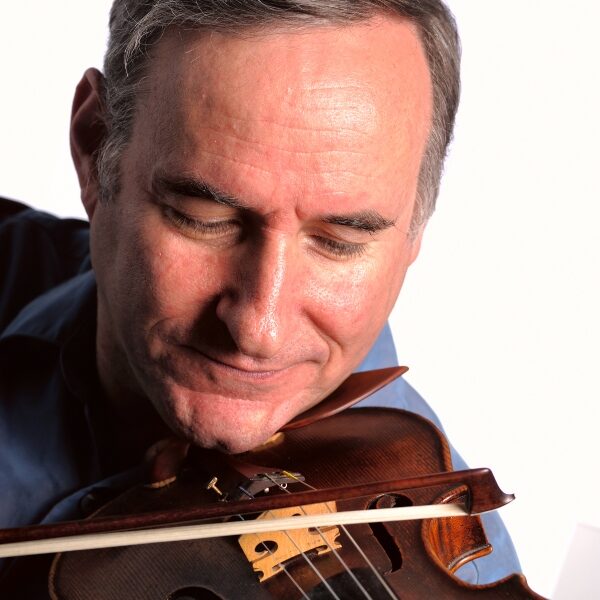
Violinist Peter Zazofsky has enjoyed a career as soloist, chamber musician and educator that spans twenty years and thirty countries on five continents. He has performed with many of the great orchestras in the US and Europe, including the Boston Symphony, the Berlin Philharmonic, Amsterdam Concertgebouw, and the Philadelphia Orchestra, in collaboration with maestros such as Tennstedt, Ozawa, Ormandy, Kurt Sanderling and Charles Dutoit. As a recitalist, Mr. Zazofsky has given innovative programs in Carnegie Hall, Sala Cecilia Meireles in Rio de Janeiro, Palais des Beaux Arts in Brussels and the Teatro Colon in Buenos Aires. He also tours the world's music centers as first violinist of the Muir String Quartet. Peter Zazofsky was born in Boston, where his father was assistant concertmaster of the Boston Symphony. Joseph Silverstein was his first teacher, and he later studied with Dorothy Delay, Jaime Laredo and Ivan Galamian at the Curtis Institute. Beginning in 1974, Mr. Zazofsky won a series of prizes and awards culminating in the Gold Medal at the 1980 Queen Elisabeth Competition and the Grand Prize of the 1979 Montreal International Competition. (He remains the only American to win this award.) In 1985 he was honored to receive the Avery Fisher Career Grant. Since then, Peter Zazofsky has made solo appearances with the orchestras of Atlanta, Baltimore, Leipzig, Santiago, Toronto, Minnesota and Montreal. He has toured Asia as soloist with the San Francisco Symphony, as well as the US with the Danish Radio orchestra. He is a frequent visitor to Israel, where he has given over forty performances of concerti, from Beethoven and Sibelius to Bach, Berg and Brahms. In recent years Peter Zazofsky has added several new facets to his career. He has given premieres of new works written for him by composers in Holland, Belgium, Denmark and Spain, and he recorded concerti by Robert Chumbley and Frederick Van Rossum in Liege, Belgium and Warsaw, Poland. Mr. Zazofsky holds the position of Associate Professor of Violin and Chamber Music at Boston University, and he occasionally serves as a jury member for the violin competitions in Montreal, Brussels, and Odense, Denmark. As first violinist of the Muir Quartet, he has performed many complete cycles of the Beethoven quartets, and has encouraged creation of new works by American composers Joan Tower, Sheila Silver, and Richard Danielpour. BM, Graduate Certificate, Curtis Institute of Music. Student of Joseph Silverstein, Ivan Galamian, and Dorothy Delay. First Prize, Montreal International Competition, 1979; Second Prize, Queen Elisabeth of Belgium Competition, 1980. Soloist with Boston Symphony Orchestra, Minnesota Orchestra, Philadelphia Orchestra, Baltimore Symphony, Berlin Philharmonic, Rotterdam Philharmonic, and Vienna Symphony. Recitals throughout Europe and United States. Member, Muir String Quartet. Faculty, Boston University College of Fine Arts, since 1987.
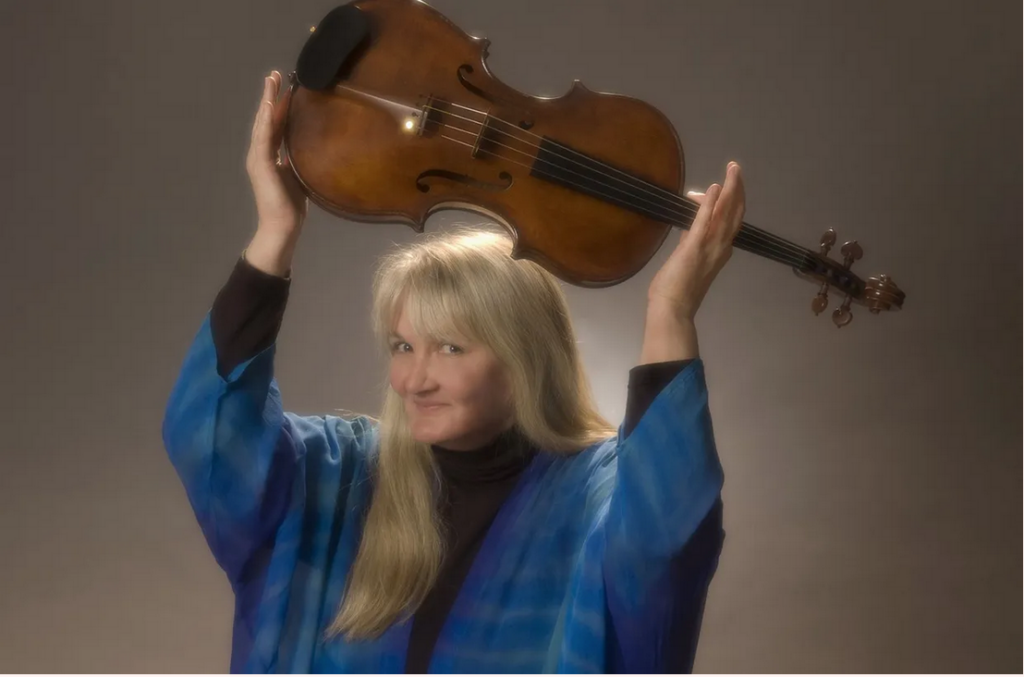
LaCourse was formerly a member of the Lehigh Quartet, the Delphic String Trio and the Aeolian Trio. She currently performs with the Pangaea Chamber Players, the Convergence Ensemble, and several other groups, as well as frequently appearing as a solo recitalist. She has performed at numerous festivals such as Aspen, Atlantic, Bowdoin, Eastern, Interlochen, Skaneateles, Musicorda, the Heifetz Institute, and the International Festivals of Campos do Jordão (Brazil), of Positano (Italy), and of Vianden (Luxembourg), as well as at some of the world’s leading concert venues, such as Vienna’s Musikverein, Berlin’s Kammermusiksaal and Washington’s Kennedy Center. As an orchestral musician, she has performed with the Baltimore Symphony Orchestra, was co-principal of the Concerto Soloists Chamber Orchestra of Philadelphia, and was formerly principal violist of the Chamber Orchestra of Grenoble France.
She holds degrees from the Peabody Conservatory of Music, where she was for many years teaching assistant to renowned pedagogue Karen Tuttle. Ms. LaCourse currently teaches viola and chairs the String Department at Boston University’s School of Music, where she was awarded BU’s Metcalf Cup and Prize, the university’s highest honor for excellence in teaching. She frequently presents master classes at music schools across the United States and internationally, and during the summer months she also teaches and performs at the annual Karen Tuttle Viola Workshops, at BU’s Tanglewood Institute where she is Director of the Viola Workshop, and at a number of other festivals and workshops. Many of her former students currently enjoy playing and teaching positions around the globe.
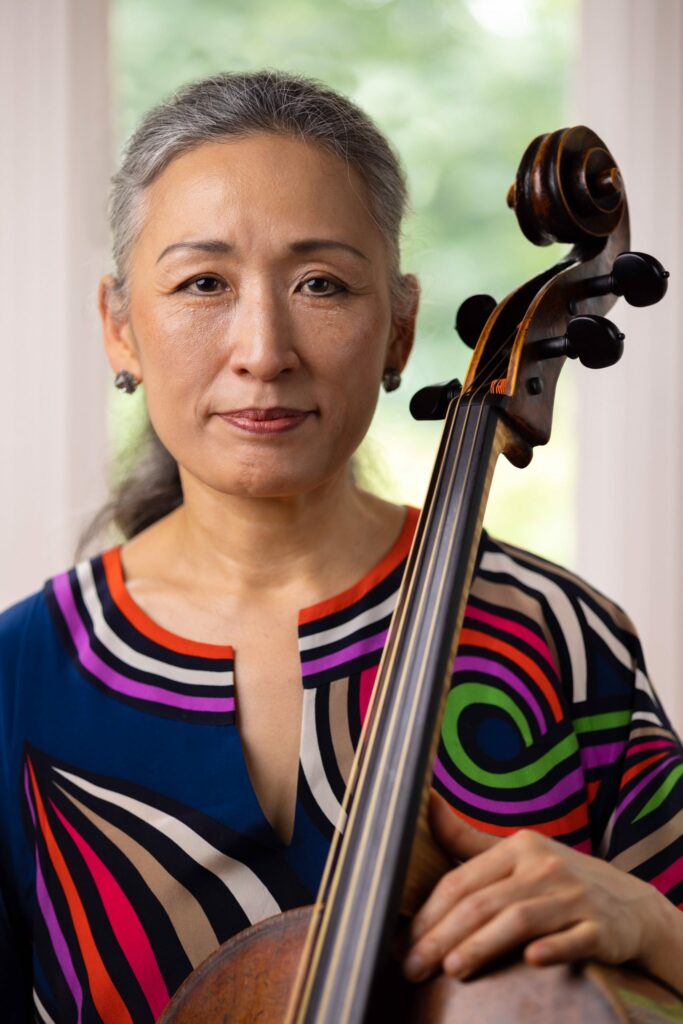
Hailed by the New York Times for her "focused intensity" and "remarkable" performances, cellist Yeesun Kim enjoys worldwide acclaim as a soloist, chamber musician and teacher. A founding member of the Borromeo String Quartet, Ms. Kim has performed in over 20 countries, and in many of the world's most illustrious concert halls and Festivals. Highlights of her 2013-14 season include the World Premiere of Lera Auerbach’s String Quartet No. 7, "Désir", performances of the Bela Bartok quartet cycle at the Montreal Chamber Music Festival and in Boston at Jordan Hall, and appearances at the Orquesta Sinfonica de Xalapa Festival in Mexico, the Bermuda Festival of the Performing Arts, and the Terra di Siena Chamber Music Festival in Tuscany. The season welcomes multiple performances with clarinetist Richard Stoltzman, and special collaborations with the Bill T. Jones Dance Company, the Chicago Chamber Musicians, and also with cellist Antonio Lysy in a special multimedia production, Te Amo, Argentina. Recent highlights include a two-week residency at Suntory Hall in Tokyo to perform the complete Beethoven String Quartets, a cycle of Dvorak quartets at the Isabella Stewart Gardner Museum in Boston, the complete Bartok quartet cycle at the Curtis Institute of Music, performances at the International MIMO Festival in Brazil, the Morgan Library in New York, the Freer Gallery in Washington, D.C., and in Nara, Japan, Beijing and Shanghai, China. Ms. Kim has performed throughout Europe and Asia with the Borromeo, in duo with violinist Nicholas Kitchen, and as a soloist, including engagements with the Philharmonie in Berlin, the Tonhalle in Zurich, the Opera Bastille in Paris, Wigmore Hall in London, the Concertgebouw in Amsterdam, Suntory Hall and Casals Hall in Tokyo, the Saejong Cultural Center in Seoul, Carnegie Hall, the Metropolitan Museum of Art in New York, Jordan Hall in Boston, the Library of Congress and Kennedy Center in Washington, DC. A much sought after chamber musician, she has been invited to perform at many festivals including Spoleto in the United States and Italy, Ravinia, Marlboro, Santa Fe, La Jolla, Rockport, Music at Menlo, the Prague Spring Festival, the Vancouver Chamber Music, the Stavanger Festival in Norway, the Evian and Divonne Festivals in France, and the Sejong Spring Festival in Korea. Her collaborations with other artists include appearances with Angelique Kidjo, violinist Joshua Bell and Pamela Frank; violists Roberto Diaz, Kim Kashashian, Paul Neubauer, Roger Tapping; cellists Paul Katz, Gary Hoffman, Lawrence Lesser, and Alisa Weilerstein; pianists Christoph Eschenbach, Leon Fleisher, Gary Graffman, Wu Han, Menahem Pressler, Rudolph Serkin, and Russell Sherman; clarinetist Richard Stoltzman, and members of the Guarneri and Julliard String Quartets. As a member of the Borromeo Quartet since its inception in 1989, Ms. Kim has had extensive involvement with NPR's "Performance Today," the Chamber Music Society of Lincoln Center in New York, and the Library of Congress in Washington, DC. Her radio and television credits also include "Live from Lincoln Center" and numerous appearances on WGBH in Boston, Radio France, and NHK Radio and Television in Japan. Recording credits include "Native Informant" featuring music of Mohammed Fairouz [2013], "As it was, Is, And will be" featuring music of Gunther Schuller [2011], "String Quartets" by Robert Maggio [2011], "Speak Like the People, Write Like the King" featuring music by Steve Mackey [2009], "Soul Garden: The Chamber Music of Derek Bermel" [2002] "Beethoven: Serioso" [2002], and "Ravel: String Quartet and Sonata for Violin & Cello" [1999]. Ms. Kim currently serves on the faculty of the New England Conservatory, in the cello and chamber music departments, and teaches each summer at the Taos School of Music in New Mexico. She has also taught at the McGill International String Quartet Academy in Canada, the Suntory Hall Fellows Academy in Japan, at the Seoul National University and National University of Arts in Korea, and for the Foulger Institute in New Jersey . A recipient of the Avery Fisher Career Grant, Chamber Music America's Cleveland Quartet Award, Lincoln Center's Martin Segal Award, and the Evian International String Quartet Competition as a member of the Borromeo Quartet, Ms. Kim has garnered numerous awards individually as well, including winner of the Ewha and Jungagng National Competitions in Korea, and the Seoul Young Artists Award for achievement in music and academics. Kim is a graduate of the Curtis Institute of Music, with advanced degrees from the New England Conservatory of Music. Her teachers include Lawrence Lesser, David Soyer, Peter Wiley, Hyungwon Chang, and Minja Hyun. She plays a Peregrino Zanetto cello, circa 1576, one of the oldest in the world.